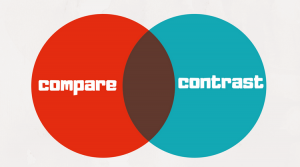Analysis: Compare and Contrast
Name
Institution
Analysis: Compare and Contrast
Compare and Contrast代写 Similarities:Case 1 use AI technologies in gene comparisons and relationships, research on drugs and their relationship with diseases
Similarities Compare and Contrast代写
In all the cases, AI has been utilized with the sole purpose of improving the diagnosis and prognosis of diseases as well as for research on other treatment methods. Case 1 use AI technologies in gene comparisons and relationships. Research on drugs and their relationship with diseases (“IBM Watson for Drug Discovery – Features | IBM”, n.d.). Case 2 has several independent platforms which use machine learning to determine drug interactions, cancer detection, chronic illness prediction, drug discovery, gene mutation and sanitation. Basically, it us cognitive computing systems for lung and colorectal cancer treatment (Somashekhar et al., 2017).Compare and Contrast代写**范文
Also, case 3 being and AI-based platform that uses patient information and to do analytics on them to determine cancer cells using Bayesian AI (Rodrigues et al., 2013). While case 4 use AI in the diagnosis and treatment of breast cancer which according to Lakonishok, Shleifer & Vishny, (1994) is one of important tool to the therapeutants in increasing the level of accuracy, safety, reliability, and treatment of cancer patients.

Differences Compare and Contrast代写
The three cases though meant to serve as medical solutions, each one of the technologies is utilized differently particularly in treatment and research of various diseases. Case 1 is mainly a cloud storage with integrated AI system where the data is used for comparison. Diagnosis as well as further queries in treatment, research and new approaches. In case 2, the AI technology was developed as a support system to the oncologists in diagnosing and treating cancer patients.Compare and Contrast代写**范文
Further on case 3, BERG Interrogative Biology aimed at making analysis on comparisons of various diseases through vitro perturbation biology and proteomic analysis. Through such comparisons. The machine is able to learn on the various protein differences which is the key is disease recognition especially the cancer cells. Case 4 is an essay on gene expression using Watson for oncologist for optimization of treatment in ER-positive. As such, each of the cases specialize in a specific area of research in medicine.
On the other hand. Compare and Contrast代写
All the cases are measured in terms of quality and safety, data security and privacy, usability and acceptance as well as outcomes and limitation. Each one of the cases have different levels of the aforementioned metrics. For instance, case which is used as a support to the oncologist is just a prototype which was under investigation on it usability, reliability, and acceptance.Compare and Contrast代写**范文
As such, the level of this metrics depends on the usage and the type of data being stored. The IBM Watson for Drugs and Discoveries is one of the cases where security of the data is taken to the other level because of sensitivity. It uses different layers of security protocols and encryptions to secure the medical data from breach or compromise.

References Compare and Contrast代写
IBM Watson for Drug Discovery – Features | IBM. Retrieved from https://www.ibm.com/products/watson-drug-discovery/features
Kim, Y., Oh, S., Chun, Y., Lee, W., & Park, H. (2018). Gene expression assay and Watson for Oncology for optimization of treatment in ER-positive, HER2-negative breast cancer. PLOS ONE, 13(7), e0200100. doi: 10.1371/journal.pone.0200100
Somashekhar, S.P., Martín, J., Norden, A. D., Rauthan, A., Arun, K., Patil, P., Ethadka, R. Y., & Kumar, R.C. (2017). Early experience with IBM Watson for Oncology (WFO) cognitive computing system for lung and colorectal cancer treatment. Journal of Clinical Oncology, 35(15), 8527-8527
Rodrigues, L., Vemulapalli, V., Walshe, A., Du, M., Keibish, M., & Jimenez, J. et al. (2013). Abstract 5230: Berg Interrogative Biology™ Informatics Suite: data driven integration of multi-omic technologies using Bayesian AI. Cancer Research, 73(8 Supplement), 5230-5230. doi: 10.1158/1538-7445.am2013-5230
更多其他:Case study代写 心理学论文代写 润色修改 代写案例 论文代写 Essay代写 研究论文代写 网课代修 代写CS 数据分析代写 Academic代写 Review代写




您必须登录才能发表评论。